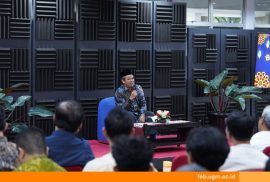Transparent and accountable governance is the foundation for positioning waqf as a strategic economic tool that empowers communities and ensures sustainable public participation. With the correct principles, cash waqf can be transformed from a charitable act into a concrete solution for sustainable economic development.
Dr. Dewi Fatmawati, S.E., M.Ec., Ph.D., Lecturer at the Department of Accounting, FEB UGM, emphasized the importance of the Waqf Core Principles (WCP) – a global standard for waqf governance aimed at enhancing professionalism, transparency and public trust. The WCP is the result of a joint initiative between the Indonesian Waqf Board (BWI), Bank Indonesia (BI), and the Islamic Development Bank’s International Research and Training Institute (IRTI-IsDB).
“This governance standard aims to assist Nazir (waqf managers) in managing waqf assets transparently, thereby fostering trust among those who contribute to waqf,” she explained during the WAKAFPRENEUR Goes to Campus event held on Friday (22/11/2014).
Dewi emphasized that the WCP Principles align the oversight of waqf governance with that of other financial sectors, such as banking and insurance, by establishing a regulatory framework that strengthens waqf management. The Principles also promote oversight of waqf management by enhancing control measures and risk management, including identifying and addressing risks in using waqf assets. In addition, the principles emphasize Shariah governance to ensure that waqf management adheres to Islamic principles.
Good governance for Nazir, she continued, is guided by the principles of transparency, accountability, responsibility, independence, and fairness. These principles place waqf within a strategic economic framework and provide clear guidelines for managing and reporting on waqf assets.
However, Dewi acknowledged that significant challenges remain in managing cash waqf. One major issue is the capacity of human resources to manage waqf funds productively. To address this, Nazhir needs to obtain certifications, improve their skills, and strengthen financial reporting to ensure transparency and accountability.
With professional management based on the WCP, Dewi expressed optimism that cash waqf could become a more significant strategic source of funding to support economic development and community welfare. By implementing these measures, waqf is expected to become a way of life embedded in society, providing spiritual and sustainable financial benefits.
Reporter: Shofi Hawa Anjani
Editor: Kurnia Ekaptiningrum
Sustainable Development Goals







